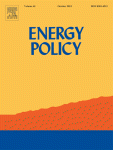
Article Publication « Direct rebound effect of residential gas demand: Empirical evidence from France » by Fateh Belaïda, Salomé Bakalogloub and David Roubaud, in Energy Policy review.
Volume 115, April 2018, Pages 23–31
https://doi.org/10.1016/j.enpol.2017.12.040
Abstract:
Energy policymakers are increasingly concerned about energy efficiency improvements, as such improvements are considered to be a key strategy in reducing energy demand in the residential sector. However, energy efficiency investments may not yield the expected energy-savings due to the rebound effect concept, which leads to lower savings than expected when energy-efficiency increases. Using the standard OLS regression and autoregressive distributed lag cointegration (ARDL) approach, this paper provides estimates of the magnitude of the rebound effect for residential gas consumption in France. Using 1983–2015 annual time-series data, the methodology is based on estimates of the gas demand elasticity with respect to service price. The empirical findings indicate that the variables used in the model are cointegrated and suggest the presence of an obvious rebound effect in residential gas use. More specifically, estimates of the direct rebound effect in residential gas demand are approximately 53% in the short-run and approximately 60% in the long-run. Our findings reject the hypothesis of a backfire effect regarding residential gas use in France and hence suggest incorporating carbon taxation, energy efficiency and alternative energy in the formulation of an energy-saving policy to facilitate the transition towards a low-carbon economy in France.
You may find the article here
